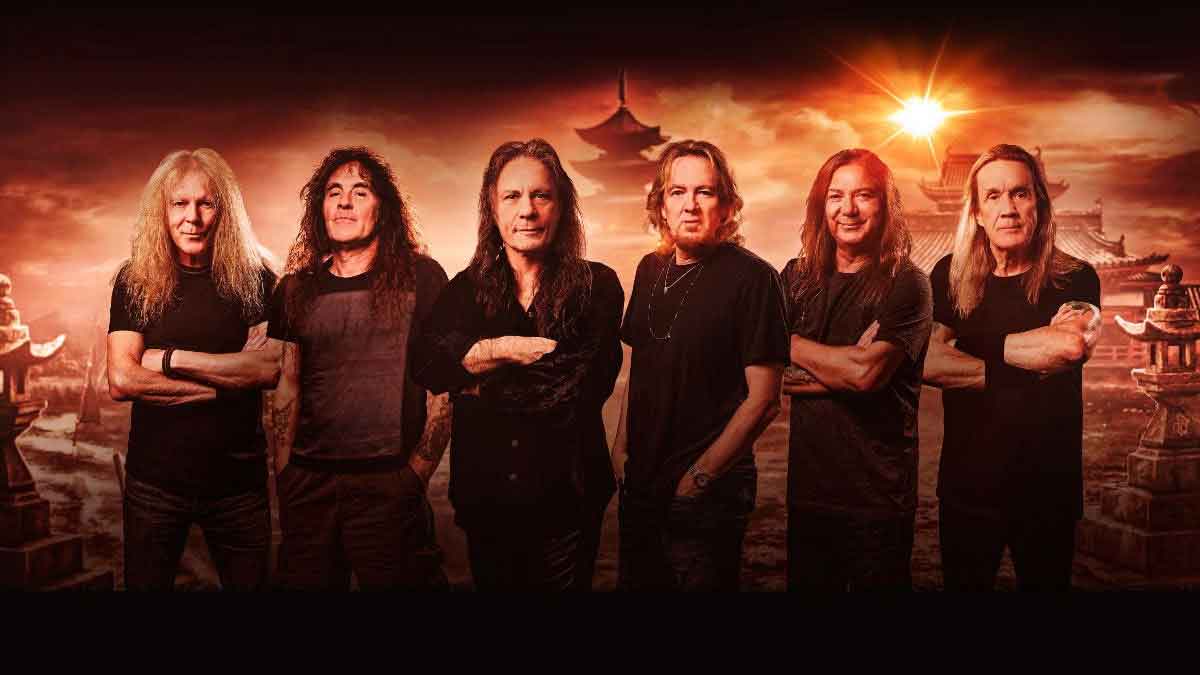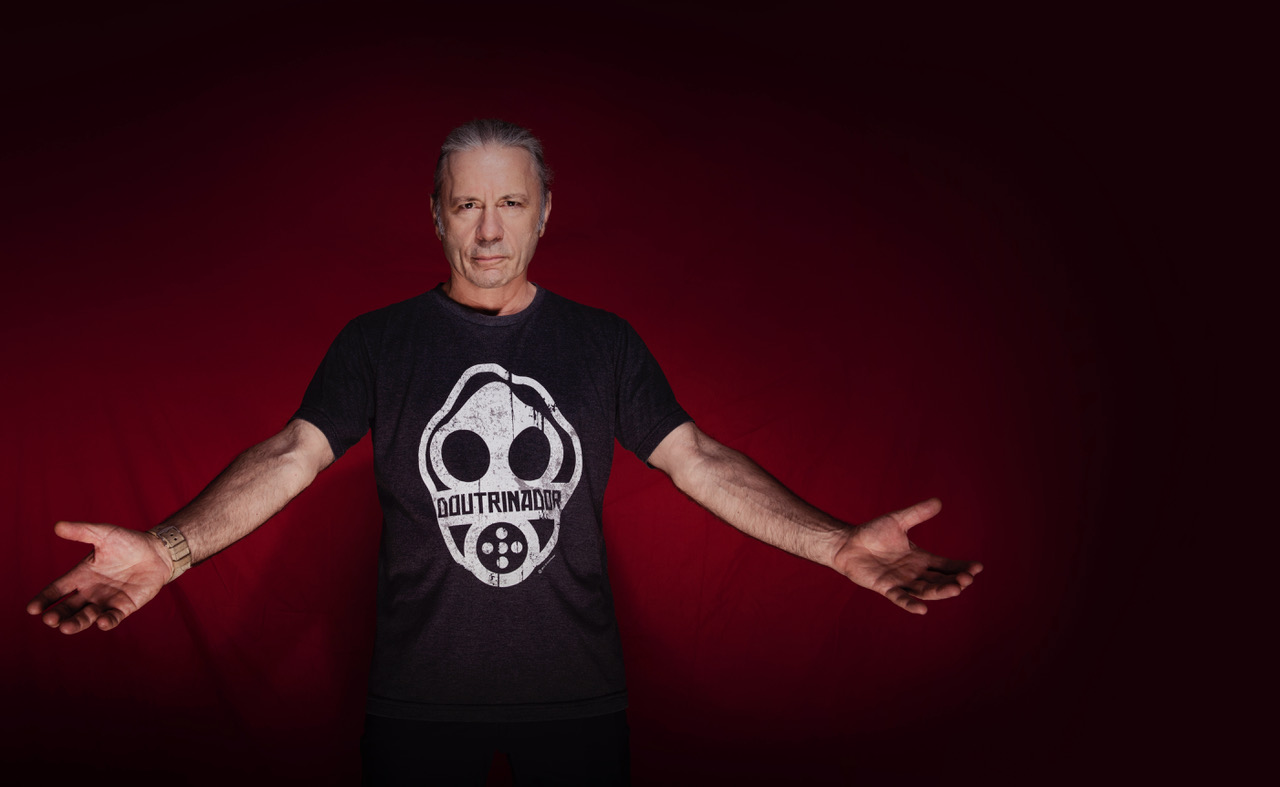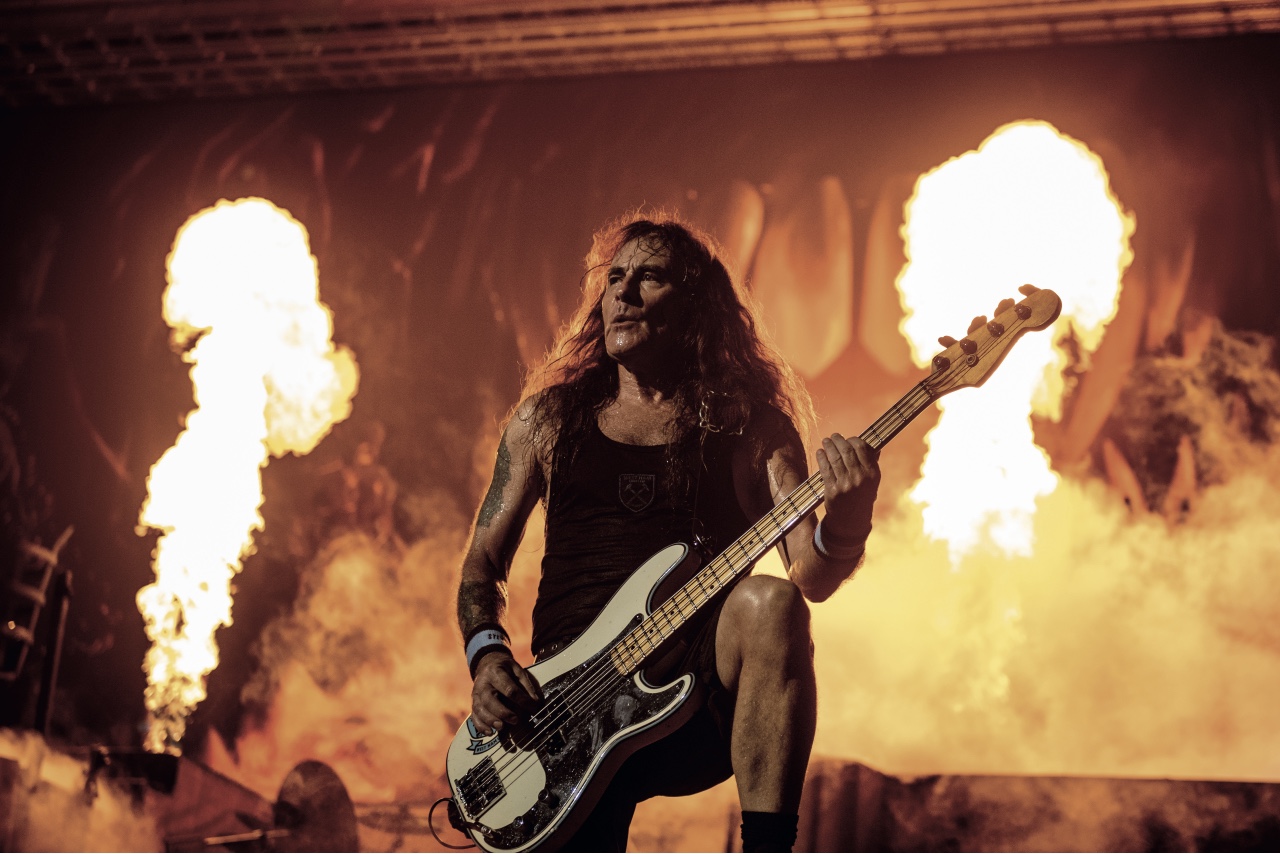The last 18 months have been a nightmare of frustration and cancelled plans for most musicians, but imagine being Bruce Dickinson. When Hammer meets the Iron Maiden singer in London, as the band prepare to unveil their 17th studio album, he has a restless, fiery look in his eyes.
Dressed, as has become traditional, in the leisurewear of a dedicated cyclist - dark, plain vest; joggers - he greets us with some expected cheery enthusiasm. But as we unzip the monstrous wonders of the album in question, the mighty Senjutsu, it becomes increasingly obvious that Bruce has been going slightly mad waiting for the world to open up again.
The last time we spoke to him on the eve of the release of a new Maiden album (2015’s The Book Of Souls), he cut a relaxed and relieved figure, the spectre of his battle with throat cancer then receding into the distance. But today, Bruce is visibly excited about what comes next, not least because it turns out that Iron Maiden have been sitting on Senjutsu since… hang on a pissing minute… 2019?! No wonder that he is so clearly delighted that we’ve just been granted a sneak preview of the full album. He leans forward in his chair and grins.
“Good, isn’t it?” he says. Yes, mate. It’s fucking great.
Bruce is perfectly correct, too. Maiden fans have become accustomed to studio albums of high quality, particularly over the band’s triumphant last 20 years, and yet Senjutsu sounds and feels somehow bigger, better and more emotionally potent than anything the band have recorded since Bruce and guitarist Adrian Smith returned to the fold in 1999, re-joining bassist Steve Harris, drummer Nicko McBrain and guitarists Dave Murray and Janick Gers as an absurdly successful new decade dawned. Significantly, it is also an album that brims with surprises, albeit all very much filtered through that instantly recognisable Maiden bombast. From the monstrous, rumbling storm of the opening title track and the hazy, proggy grooves of The Time Machine, to the bluesy stomp’n’squall of first single The Writing On The Wall and The Parchment’s prog-fuelled labyrinth of riffs and spiralling melodies, Senjutsu delivers more of the glorious, classic Maiden same and numerous curveballs at the same time.
“The nice thing is to still be able to think outside the box a little bit,” Bruce notes. “The Writing On The Wall is a great choice for the first single, and another cool thing is that it is in no way indicative of the rest of the album. It should be called ‘The Writing Off The Wall’! Ha ha ha!”
But somehow it still sounds like Maiden and couldn’t be anybody else. Does it give you a collective thrill, that you can still do something different like that?
“Yeah, exactly. It still sounds like us. When Adrian and I sort of put the song together, Adrian had the riff, because Adrian always has the riff. Then off we went. I put the melody over it and the words, and it’s just one of those songs that wrote itself, almost. We were like, ‘Is this going to fly?’ but ’Arry [Steve] loved it. He said, ‘Yeah, I quite like that sort of Cajun feel!’ We both looked at each other, like, ‘Cajun?! Alright, fair enough!’ Ha ha ha! But it’s got a great feel to it. You might think you’ve wandered into a fucking Thunder record or something.”
Until the drums kick in…
“Oh yeah, the drumming on the whole album is ridiculous. It’s so good. Honestly? I think it’s the best Nicko’s ever drummed. Honest to god, going all the way back to Piece Of Mind and Powerslave, I don’t think he’s ever drummed better. He’s just so on it.”

Although not quite as desperate to be let off the leash as his notoriously chill-deficient frontman, six-stringer Janick Gers is in a comparably buoyant mood when Hammer speaks with him for another Senjutsu debrief a week later. Endearingly, in the midst of the last two years’ abject mayhem, the veteran guitarist has missed out on a couple of major milestones. Late in 2019, he somehow completely failed to celebrate being a member of Iron Maiden (and continually whacking Eddie in the bollocks with his guitar) for 30 years. Meanwhile, he sounds genuinely startled to find that Senjutsu is his 10th Maiden studio record. Nonetheless, Janick is very, very enthusiastic about the new record and makes a point of saying how much he enjoyed the process of making it, “even if it seems a long time ago now!”
“Normally we would come in and rehearse for a few weeks, so we pretty much have all the songs,” he continues. “Every now and then we’ve gone in with an extra song or an extra set of ideas, and we’ve worked them up in the studio, but this time we learned them and played them, as fresh as we could. We have a band with so many ideas, everyone’s bringing things in and everyone’s trying to make every song better. There’s a real camaraderie about how we write as a band. Everyone wants it to be the best. It’s just exciting. Isn’t that how it should be? Rather than coming in and knowing exactly what’s coming next? You never know what’s coming next from Maiden and that’s part of the strength of the band.”
Maiden’s collective enthusiasm for trying new ideas and gently tinkering with the band’s esteemed formula seems to have gained momentum in recent times. Senjutsu may not feature anything quite as ambitious or extravagant as The Book Of Souls’ 18-minute epic, Empire Of The Clouds, but its adventurous spirit is brashly on display throughout.
“Yeah, we’re always looking for different avenues,” notes Janick. “We’re treading the Maiden path and whatever we do sounds like us. It doesn’t matter what you bring in. It’s always worth bringing something in, even if you’re thinking, ‘Nah, it’s not right for Maiden…’! By the time you’ve finished playing it with Nicko, with the way he plays and how Steve plays his bass, and the way Dave and Adrian play, it’s all just very natural. We don’t sit and work a lot of stuff out, we just play and it seems to gel. No one has to be told what to do, and it all comes out sounding like Maiden.”
Janick has two writing credits on the new album: the short, sharp and catchy Stratego and the woozy, menacing The Time Machine, both co-written with Steve Harris. But it’s the sheer open-ended, creative free-for-all that Maiden continue to enjoy in the studio that seems to delight him the most.
“I just think we still surprise each other. I’ve never been in a band with so many ideas. There are so many ideas flowing in all the time, and so many that never get used! When you look at the amount of stuff that’s on this album… in the past, an album would be 40 minutes long. These are like triple albums!”
And do you agree with Bruce that Nicko is on particularly brilliant form on this album?
“Ah, yes, Nicko is playing great. He’s a powerhouse,” Janick replies. “He powers the band. He pushes the band. He’s got an incredible personality – there’s about five of him I think! Ha ha ha! But he’s incredible. You need that powerhouse behind you. He’s 70 next year? He’s playing like a teen. It’s incredible. I’ve never heard him so solid. I don’t think you can tour, the way we’ve toured over the years, and not be fit. If your mind’s clear and you’re fit and healthy, then you’re playing better and being creative. So we’re all fit… for old men…”

At just under 82 minutes long and rammed to the gills with epic, exhilarating moments, Senjutsu is an album that will doubtless tick every conceivable box for discerning fans of Iron Maiden. But there are numerous moments when the band sound more fiercely imaginative than ever before. Again, the opening title track stands out as particularly astonishing: palpably heavier than anything Maiden have recorded in the past, and yet graced with a soaring vocal performance from Bruce that will definitely cause grown metalheads to become a bit misty-eyed. It’s no kind of typical Maiden song, and yet could not be the work of anyone else, right down to Steve Harris’s hazily cryptic tales of – we think - threatened imperial walls and swarming, warring tribes in ancient Japan.
“Steve picked that as the title track. I don’t know why, but he suddenly got bitten by the Japanese bug,” Bruce states. “I’ve been trying to find out the origin of the word ‘Senjutsu’ and there seem to be multiple variants, but as far as Steve’s concerned, it means ‘The Art Of War’. But to be honest, I don’t really care. It’s a good excuse for chopping things up with samurai swords! The album is not a concept album. The cover has a concept and it’s Eddie as a samurai, so that’s great. I love his transformation into a samurai in the video. But the rest of the album? It’s not a concept album about that at all. It’s a collection of different songs.”
And what songs they are. Noticeably dominated by notions of war and death, Senjutsu seems to exhibit some form of faint kinship with 2006’s A Matter Of Life And Death: for many, the pick of Maiden’s post- millennial studio albums, and another record with a prevailing atmosphere of war-torn dread. Bruce is eager to point out that Senjutsu was all written and recorded before the pandemic, and so if the new songs seem to reflect ongoing dark times, it is more due to (un)happy coincidence than anything more deliberate. Instead, Maiden continue to demonstrate how it is still possible to conjure universal themes that resonate widely, even in an increasingly divided age. Notably, the melancholic and brooding Darkest Hour delves into the achievements and personal turmoil of no lesser figure than Winston Churchill, with results that are poignant, unsettling and proudly representative of the human experience in all its infinitely complex and daunting splendour.
“Yeah, Churchill is a case in point,” says Bruce. “You’ve got somebody who was a very flawed character. He suffered from depression, he was probably a functioning alcoholic. But at the one time when it actually mattered, he stood up, when other people would’ve rolled over. You’ve got to be prepared to fight sometimes, for what you believe in and for your freedom. Here was a man who was riddled with self-doubt, no matter what the external perception was.”
A lot of Maiden music seems to be about survival, resilience and heroism, and this album more than most…
“A lot of it is about self-sacrifice. It might be in a wartime environment or situation, but war brings out the worst and best in everything. From nuclear power stations to satellites, our entire modern world is largely based on what NASA and the Soviet Union developed in the space programme. The reason they developed it was not that they were just dreamers; it was because it was a pissing contest between two psychopathic empires! And you can’t take the complexity out of human relations like that, unfortunately. We are what we are.”
Despite Maiden’s reputation for writing songs about historical events and real-world battles, the band have also mined a rich seam of introspection and existential meandering over the last four decades. Outwardly, of course, Maiden are eternally invincible: undisputed gods of heavy metal, revered around the world, and visibly having a rather lovely time doing it. But songs from the new album like Darkest Hour and grandiloquent finale Hell On Earth (the latter written by Steve Harris) continue to add to a palpable sense that both lyricists have experienced a few dark nights of the soul along the way.
“Yeah, the difference is, I suppose, that Steve and I would both rather put that into shows and albums than go onto chat shows and talk about it,” Bruce counters. “I know Steve has quite a deep-seated distrust of what we think of as being the modern world. To the extent that in Hell On Earth, the song is saying ‘Are we done here yet? Can we just start again and I’ll see you in another life, on the other side, when we’ve all gone back to normal?’”

So what exactly is normal at this point? A stunning new Iron Maiden album is definitely a good start. Some face-shredding live shows would also be nice, and those are coming too. Maiden return to the Legacy Of The Beast tour next summer, with a Download appearance on June 11 firmly on the schedule and, according to Janick, the vague promise of at least a couple of songs from Senjutsu being added to that already well-established setlist. Meanwhile, Bruce has fully recovered from a recent hip replacement operation and is, in his own words, “jumping around all over the place” in anticipation of a return to the stage. Maiden are back and it’s all kicking off. That sounds pretty close to normal to us.
“Senjutsu hasn’t been so long in the making, just long in the waiting!” Bruce declares, sounding genuinely exasperated at it all. “This album is a step up. A Matter Of Life And Death was really good. I’ve gone back and revisited it a little bit, and I thought, ‘Shit, that was really good album.’ With this one, I’d go back to an album like Brave New World, which I think was a fantastic record. So I’m really chuffed with this one.”
“It’s not about going out and playing the same songs over and over again. If you’re still creating stuff, then that’s what makes you valid,” Janick concludes. “There’s always something new coming from Maiden. We’re excited about doing it all again and getting back on the road. Sure, we’re not getting any younger, and who knows about the future? But right now, we’re creatively buzzing. I think we’re still at the top of our game.”
Senjutsu is out September 3 via Parlophone. Iron Maiden will headline Download 2022 next June

